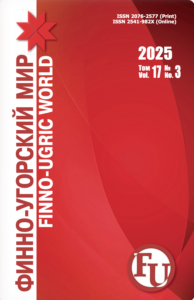PHILOLOGY
I. A. Anashkina (Saransk, Russia). Teaching English Phonetics to a Finno-Ugric class
S. S. Dinislamova (Khanty-Mansiysk, Russia). Interpretation of mythological plots in the works by Yuvan Shestalov
G. S. Ivanova (Saransk, Russia), N. V. Butylov (Moscow, Russia), N. V. Letkina (Saransk, Russia). Representation of Finno-Ugric vowel *a at the stem end in the Mordovian languages
V. N. Maksimov (Yoshkar-Ola, Russia). Postpositional government on the pages of the newspaper “Voina Uver”
I. S. Matashina (Petrozavodsk, Russia). The motif of the lost homeland in the lyrics by K. A. Tavaststjerna
O. E. Polyakov, P. E. Sedova (Saransk, Russia). Pages of the history of development of Mordovian linguistics (XVII – beginning of the XXI century)
I. V. Pyanzina (Saransk, Russia). Artistic world of critical and publicist works by M. I. Malkina
V. N. Solovar (Khanty-Mansiysk, Russia). The semantics of phraseological units-somatisms with component sym/săм meaning “heart” in the Ob-Ugric languages
HISTORICAL STUDIES
R. R. Sadikov, R. A. Abdulkhalikov (Ufa, Russia). Ethnographic study of the Mordovians in Bashkiria (historiographic review)
S. A. Tambi (Moscow, Russia). Tosno Estonians
CULTURAL STUDIES
A. G. Burnaev (Saransk, Russia). Sheaf holiday and tripping movements in the form of folk ditty as the genres of the ethnic folk works of Mordovians
I. N. Shkolkina (Saransk, Russia). Impact of globalization on the self-awareness of the Mordovians
EVENTS, PEOPLE, BOOKS
A. B. Tanaseichuk (Saransk, Russia). Erzya: familiar and unknown
N. V. Kondrat’eva, O. B. Strelkova (Izhevsk, Russia). Mira A. Samarova (to the 50th anniversary)






















